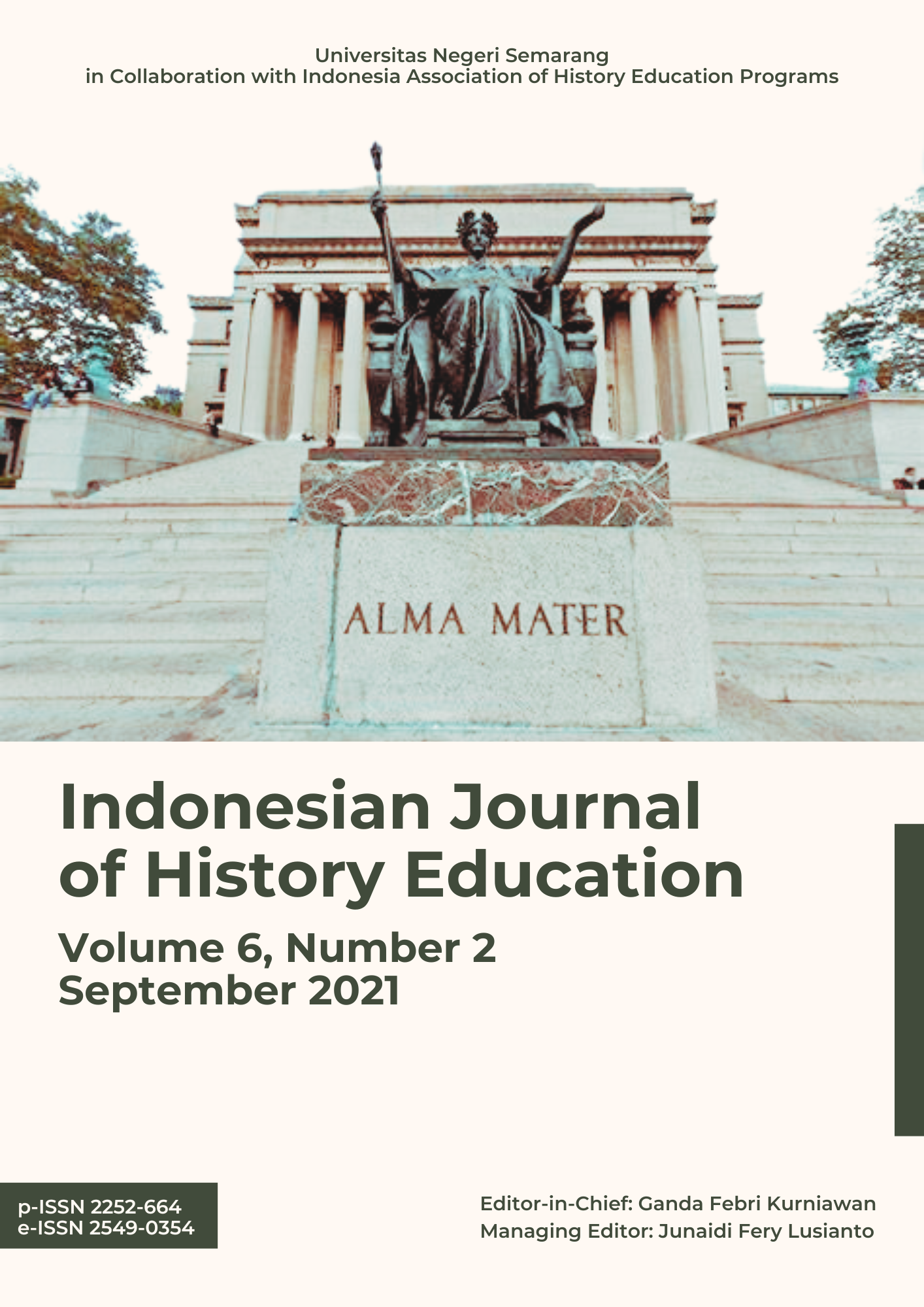Local Heroes Enter History Class
A Critique of Hegemonic Ideology in the Narrative of Heroic History
Abstract
This study aims to critique the textual narrative of heroic history, with a particular focus on the philosophy of the Local Hero, the integration of Local Heroes into history classes, and the academic community's reception of the Local Hero concept. Employing a qualitative approach with a critical ethnographic design, the research reveals several key findings: 1) The Local Hero concept is philosophically well-suited for teaching local history; 2) History classes become more engaging when popular concepts are incorporated, especially given that the millennial generation tends to be less interested in overly political or elitist historical narratives, making the Local Hero concept particularly relevant; and 3) The concept receives positive feedback from both educators and students in the classroom. Based on these findings, the researcher concludes that there is a current need for innovation in history teaching to align with contemporary values and interests.
References
Barrington Moore, Jr. 1966. The Social Origins of Dictactorship and Democracy. Boston: Beacon Press.
Bourdieu, Pierre. 1972. Outline of Theory of Practice. Cambridge: Cambridge University Press.
Braudel, Fernand. 1980. On History. (Terj. Sarah Matthews). Chicago: University of Chicago Press.
Carr, E.H. 2014. Apa Itu Sejarah?. Depok: Komunitas Bambu.
Collins, Jenny dan Tim Allender. 2013. “Knowledge transfer, educational change and the history of education: New theoretical frameworks”. Dalam History of Education Review, Vol. 42, No. 2, Hlm. 112-118.
Creswell, John W. 2008. Reseaech Design: Pendekatan Kualitatif, Kuantitatif, dan Mixed. Edisi Ketiga. Yogyakarta: Pustaka Pelajar.
Creswell, John W. 2016. Research Design: Pendekatan Metode Kualitatif, Kuantitatif, dan Campuran. Yogyakarta: Pustaka Pelajar.
Erll, Astrid., Nünning, Ansgar. 2008. Cultural Memory Studies: An International and Interdiciplinary Handbook. Berlin: Walter de Gruyter GmbH & Co.
Fathurahman, Oman. 2005. “Naskah dan rekonstruksi sejarah lokal Islam: Contoh kasus dari Minangkabau”. Dalam Jurnal Wacana, Vol. 7, No. 2, Hlm. 145-152.
Foucault, Michel. 1976. The Archaeology of Knowledge, terj. dari bahasa Prancis oleh Alan M. Sheridan Smith.New York: Harper & Row Publisher.
Gardiner, Patrick. 1959. Theories of History. New York: The Free Press.
Halbwachs, Maurice. 2011. On Collective Memory. (Terj. Lewis A. Coser). Chicago: University of Chicago Press.
Hasan, S.H. 2012. Pendidikan Sejarah Indonesia, Isu dalam Ide dan Pembelajaran. Bandung: Penerbit Rizky.
Hook, Sidney. 1999. The Hero on History. Boston: Beacon Press.
Kartodirdjo, Sartono. 2016. Pendekatan Ilmu Sosial dalam Metodologi Sejarah. Yogyakarta: Ombak.
Kocchar, S.K. 2008. Pembelajaran Sejarah: Teaching of History. Jakarta: Gramedia Widiasarana Indonesia.
Kuntowijoyo. 1985. “Muslim Kelas Menengah Indoensia dalam Mencari Identitas 1910-1950”. Dalam Majalah Prisma, Vol. 14, No. 11, Hlm. 35-51.
Kuntowijoyo. 2003. Metodologi Sejarah. Edisi Dua. Yogyakarta: Tiara Wacana.
Kuntowijoyo. 2008. Penjelasan Sejarah (Historical Explanation). Yogyakarta: Tiara Wacana.
Kuntowijoyo. 2013. Pengantar Ilmu Sejarah. Yogyakarta: Tiara Wacana.
Kurniawan, Ganda Febri. 2017. Pengajaran Sejarah Lokal sebagai Counter Wacana Ekstremisme Global di Indonesia (Studi Kasus di Dua Tempat). hlm. 152-170. dalam Anne Shakka Ariyani dan A. Harimurti (Edt.). Nasionalisme di Tengah Kewargaan Budaya dan Ekstremisme Global. Yogyakarta: Sanata Dharma University Press.
Madison, D.S. 2005. Critical Etnography: Methods, Ethics, and Performance. Thousand Oaks, CA: Sage.
Maslamah. 2016. “Nilai-Nilai Karakter dalam Kurikulum Humanistik di FITK IAIN Surakarta”. Dalam At-Tarbawi: Jurnal Kajian Pendidikan Islam, Vol. 1, No. 2, Hlm. 157-175.
Monchinski, T. 2011. Engage Pedagogy, Enreged Pedagogy: Reconciling Politics, Emotion, Religion, and Science for Critical Pedagogy. Rotterdam: Sense Publisher.
Nordholt, Henk Schulte, Bambang Purwanto, dan Ratna Saptari. 2008. Perspektif Baru Penulisan Sejarah Indonesia. Jakarta: Yayasan Obor Indonesia.
Paik, Susan J, dkk. 2016. “Filipinos in the U.S.: Historical, Social, and Educational Experiences”. Dalam Social and Education History, Vol. 5, No. 2, Hlm. 134-160.
Purwanto, Bambang. 2006. Gagalnya Historiografi Indonesia Sentris?. Yogyakarta: Ombak.
Rahma, Zaynah dan Susan J. Paik. 2017. “South Asian Immigration and Education in the U.S.: Historical and Social Contexts”. Dalam Social and Education History, Vol.6, No. 1, hlm. 26-52.
Ritzer, George. 2006. Teori Sosial Postmodern. Yogyakarta: Kreasi Wacana
Romadi dan Ganda Febri Kurniawan. 2017. “Pembelajaran Sejarah Lokal Berbasis Folklore untuk Menanamkan Nilai Kearifan Lokal pada Siswa”. Dalam Jurnal Sejarah dan Budaya, Vol. 11, No. 1, Hlm. 79-94.
S. Leo Agung. 2015. “The Role of Social Studies and History Learning in Junior High School in Strengthening The Students Character”. Dalam Paramita: Historical Studies Journal, Vol. 25, No. 2, Hlm. 238-246.
Utomo, Cahyo Budi dan Ganda Febri Kurniawan. 2017. “Bilamana Tradisi Lisan Menjadi Media Pendidikan Ilmu Sosial di Masyarakat Gunungpati”. Dalam Harmony, Vol. 2, No. 2, Hlm. 169-184.
Voke, H. 2007. Pedagogy of the Oppresed, Civic Engagment and Education. Washington DC: Georgetown University.
Warto. 2017. “Tantangan Penulisan Sejarah Lokal”. Dalam Sejarah dan Budaya, Vol. 11, No. 1, Hlm. 123-129.
Copyright (c) 2021 Indonesian Journal of History Education

This work is licensed under a Creative Commons Attribution 4.0 International License.
Copyright Notice
An author who publishes in the Jurnal Indonesian Journal of History Education agrees to the following terms:
- Author retains the copyright and grants the journal the right of first publication of the work simultaneously licensed under the Creative Commons Attribution-ShareAlike 4.0 License that allows others to share the work with an acknowledgement of the work's authorship and initial publication in this journal
- Author is able to enter into separate, additional contractual arrangements for the non-exclusive distribution of the journal's published version of the work (e.g., post it to an institutional repository or publish it in a book) with the acknowledgement of its initial publication in this journal.
- Author is permitted and encouraged to post his/her work online (e.g., in institutional repositories or on their website) prior to and during the submission process, as it can lead to productive exchanges, as well as earlier and greater citation of the published work (See The Effect of Open Access).
Read more about the Creative Commons Attribution-ShareAlike 4.0 Licence here: https://creativecommons.org/licenses/by-sa/4.0/.




